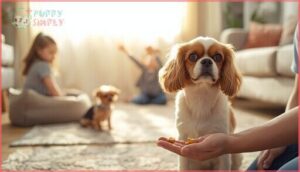This site is supported by our readers. We may earn a commission, at no cost to you, if you purchase through links.
Your daughter tugs your sleeve at the shelter, eyes locked on a fluffy puppy that barely reaches your ankle. “This one, Mom!” But here’s what most families don’t realize until they’re wrestling a hyperactive terrier at 2 AM: size alone doesn’t determine whether a small dog will thrive in your home.
I’ve treated hundreds of small breeds in my practice, and the families who get it right from the start share one thing in common—they match the dog’s temperament and energy to their actual lifestyle, not just their living room square footage. The right small dog breeds for families with small dogs transform into steadfast companions who adapt to school pickup routines, tolerate sticky toddler hugs, and settle peacefully during movie night.
Finding that perfect match starts with understanding what really matters beyond those adorable puppy-dog eyes.
Table Of Contents
- Key Takeaways
- Key Factors When Choosing a Small Family Dog
- Most Popular Small Dog Breeds for Families
- Small Breeds With Gentle Temperaments
- Training and Socialization Tips for Small Breeds
- Care and Health Essentials for Small Family Dogs
- Frequently Asked Questions (FAQs)
- What are the best small hypoallergenic dog breeds for families?
- Which small dog breeds are known for being the calmest?
- How do I find a reputable small dog breeder in my area?
- What are some tips for introducing a small dog to young children?
- Can small dogs safely live with other household pets?
- What age is best to adopt a small dog?
- Do small dogs travel well in cars and planes?
- Conclusion
Key Takeaways
- Matching a small dog’s temperament and energy level to your family’s lifestyle is far more important than choosing by size or cuteness alone.
- Breeds like Bichon Frise, Cavalier King Charles Spaniel, Boston Terrier, Havanese, and Beagle consistently thrive in family settings due to their gentle, adaptable natures.
- Early socialization, consistent positive training, and proper grooming are key to raising a confident, well-adjusted small dog in a busy household.
- If allergies are a concern, hypoallergenic breeds such as Bichon Frise, Maltese, Toy Poodle, and Havanese are excellent options when kept well-groomed.
Key Factors When Choosing a Small Family Dog
Picking the right small dog for your family isn’t just about falling for a cute face—it’s about finding a match that works with your real life.
Choosing a small family dog means finding a real-life match, not just falling for a cute face
You’ll want to think through temperament, your kids’ ages, how much space you’ve got, and whether anyone’s sneezing at the thought of pet dander.
Let’s walk through the key factors that’ll help you choose a pup who truly fits your household.
Matching Breed Temperament With Family Needs
Temperament testing reveals patterns that protect household harmony—you want a breed whose energy and patience align with your family dynamics. Consider these breed compatibility markers:
- Gentle tolerance for toddler play reduces stress-induced reactions
- Trainability through positive reinforcement reinforces consistent house rules
- Moderate barking maintains calmer urban living
- Social adaptability with other pets ensures smoother introductions
Socialization strategies start early, but the right small dog breeds make family-friendly matches far easier. Effective communication relies on using clear science information to understand canine behavior.
Considering Children’s Ages and Activity Levels
Age considerations shape breed selection more than you might realize. Younger children under five thrive with gentle, low-to-moderate energy family pets that tolerate toddler unpredictability. School-age kids handle higher activity levels but still need supervision during play. Teens can partner with more athletic small dog breeds for structured training routines.
Match your family dynamics and child safety needs to a breed’s natural temperament for lasting harmony. When evaluating breeds, consider the importance of research methodology in understanding their behavior and needs.
Assessing Space and Lifestyle Compatibility
Your living situation directly affects which small dog breeds will thrive. Before choosing a family-friendly dog breed, evaluate these lifestyle factors:
- Exercise capacity: Most small breeds need 15–60 minutes daily, though indoor play works for apartment families.
- Household activity: Frequent visitors or chaos may stress noise-sensitive dogs.
- Climate considerations: Heating, cooling, and flooring impact comfort.
- Home safety: Child ages and furniture layout prevent accidents.
Allergy-Friendly Small Dog Options
If pet allergies are a concern, you’ll want to look closely at hypoallergenic breeds with low-shedding coats. Bichon Frises, weighing 12–18 pounds, produce minimal dander when groomed regularly, making them excellent family-friendly dog breeds. Toy and Miniature Poodles are also top picks—their tightly curled coats reduce loose hair.
Remember, dander reduction requires consistent pet care and maintenance to keep small dogs truly allergy-friendly.
Most Popular Small Dog Breeds for Families
You’ve probably heard about these breeds—and there’s a good reason they show up on every family-friendly list. They consistently earn their reputation through gentle temperaments, adaptability to home life, and genuine affection for kids.
Let’s look at five small dogs that families trust, why they work so well in households, and what makes each one special.
Bichon Frise – Playful and Sociable
If you’re after a little cloud of cheerfulness, the Bichon Frise consistently ranks among top small dog breeds for families. These pups thrive in small spaces and love being part of family dynamics—especially with kids aged six and up. Their sociability shines through, but here’s what you’ll need to keep in mind:
- Bichon grooming demands regular brushing to prevent matting
- Playful training works best with positive reinforcement methods
- They adapt wonderfully to apartment living
- Socialization tips: introduce children early for best results
- Monitor for separation anxiety with consistent routines
Cavalier King Charles Spaniel – Gentle and Loving
When you’re looking at family-friendly dog breeds, the Cavalier King Charles Spaniel stands out for its gentle nature and affectionate temperament. These loving companions consistently rank high among small dog breeds for families because they’re genuinely good with kids and other pets.
Cavalier training responds well to positive methods, though you’ll want to stay on top of spaniel health—heart concerns pop up more often than we’d like in this breed.
Boston Terrier – Adaptable and Friendly
Boston Terriers bring adaptability and cheerful companionship to family life—you’ll find they adjust well to apartments or houses without fuss! The Boston temperament shines in family settings, with medium energy that suits kids beautifully.
- These friendly dogs usually weigh up to 15 pounds, perfect for smaller spaces
- Terrier training responds well to positive methods, though consistency matters
- Their playful nature and minimal exercise needs make them low-maintenance family pets
Havanese – Affectionate and Intelligent
If you’re after a dog that combines brains with a warm heart, Havanese fit the bill perfectly! These intelligent dogs excel with Havanese training because they’re keen to please and quick learners.
Their gentle nature makes them ideal family companions—they adore children and adapt beautifully to apartment living. Weighing up to 18 pounds, these small dog breeds bring affection and smarts without overwhelming your space!
Beagle – Patient and Kid-Friendly
When you think about fearless explorers with waggy tails, Beagles steal the show! These 30-pound companions bring patience and energy to family dynamics, making them stars in kid interaction.
- Your seven-year-old tossing a ball in the backyard while your Beagle bounds after it with infectious enthusiasm
- Teaching pet socialization through gentle sniffing sessions at the park
- Beagle training that turns curious snouts into well-mannered family members
Their breed characteristics balance playfulness with tolerance perfectly!
Small Breeds With Gentle Temperaments
If you’ve got young kids or just want a dog that won’t overwhelm your household, temperament matters more than cuteness. Some small breeds naturally lean toward patience and gentleness, making them safer and easier to manage around children.
Let’s look at five breeds known for their calm, affectionate personalities that fit well into family life.
Shih Tzu – Loyal and Calm
If you’re searching for a calm breed with steady loyalty, the Shih Tzu checks every box. This breed typically is affectionate and patient with children when supervised, making it one of the most family-friendly dog breeds.
You’ll need to commit to regular Shih Tzu grooming—think daily brushing—but their gentle temperament and adaptability to smaller living spaces make them wonderful loyal companions for families seeking a relaxed, loving pet.
Maltese – Sweet-Tempered and Playful
Like the Shih Tzu, the Maltese brings a gentle, patient nature that works beautifully with older children. You’ll appreciate their lightweight build and adaptability to small spaces, plus they’re playful without being overwhelming.
Key considerations for your family:
- Daily brushing prevents matting in their silky coat
- Playful training with positive reinforcement works best
- Regular Maltese grooming appointments keep them comfortable
- Proper dog nutrition maintains their petite frame
Italian Greyhound – Affectionate and Quiet
If you’re drawn to quieter, elegant companions, the Italian Greyhound delivers an affectionate nature without constant noise. They’re ideal for small spaces yet still need gentle exercise—short daily walks satisfy their moderate energy.
Their minimal coat care is a relief compared to fussier breeds, and they bond deeply with family members. With early socialization and calm, supervised interactions, they integrate beautifully into homes with respectful children.
Miniature Schnauzer – Even-Tempered and Alert
The Miniature Schnauzer brings intelligence and alertness without being overly high-energy—perfect for first-time dog owners. Schnauzer training responds beautifully to positive reinforcement, and their alert behavior makes them attentive companions.
You’ll appreciate their even temperament around family dynamics, though miniature grooming and regular dental care are part of the routine. They adapt to various living environments with consistent structure, making them genuinely family-friendly dog breeds.
Yorkshire Terrier – Affectionate and Adaptable
Yorkshire Terriers pack affection into a petite frame, adapting beautifully to apartments and homes alike.
When you’re looking at family-friendly dog breeds, Yorkies shine with proper canine socialization—introduce them to children early, and you’ll see their gentle side emerge.
Daily coat maintenance and ear care become part of your routine, but terrier training with positive reinforcement keeps small dog exercise manageable. They thrive on mental stimulation, making Yorkie nutrition and family pet dynamics smoother when you stay consistent.
Training and Socialization Tips for Small Breeds
Training a small dog isn’t just about teaching commands—it’s about building a confident, well-adjusted companion who thrives in your family environment. The good news? Most small breeds are smart and keen to please, but they need consistent guidance from day one.
Let’s walk through the essential training strategies that’ll set your pint-sized pup up for success.
Early Socialization With Children
Think of puppy socialization as teaching your small dog breeds to love your family from day one. Before ten weeks, introduce your pup to children in calm, positive settings—gentle handling builds confidence and kid-friendly behavior that lasts.
Supervised child interaction teaches everyone boundaries, strengthening family dynamics while keeping dog safety front and center. Gradual exposure, paired with treats, makes social learning stick.
Managing Barking and Separation Anxiety
Consistency works wonders when you’re tackling barking and separation anxiety in small dog breeds. Regular, short training sessions can cut barking by 40% in just four to six weeks.
Pairing crate training with enrichment toys keeps your pup calm when you’re gone, while moderate daily exercise curbs problem behaviors.
Supervised practice departures teach your dog that being alone isn’t scary—it’s just part of the routine.
Positive Reinforcement for Family Settings
Reward systems tap directly into canine psychology—when you praise your pup immediately after good behavior, compliance jumps 20–40%. Pairing treats with cues like “sit” speeds up learning in small breeds, and high-value rewards keep training sessions engaging.
Start with continuous reinforcement, then shift to variable schedules for long-lasting results that fit smoothly into your family dynamics.
Preventing Problem Behaviors in Small Dogs
Small dogs can develop fear aggression fast, but early socialization techniques cut that risk by half. Crate training paired with environmental management—think puzzle feeders and safe zones—keeps boredom and destructive habits in check. Behavioral modification through counterconditioning works wonders for anxious pups.
When you blend these small dog care and training strategies with consistent family-friendly routines, you’ll raise a confident, well-adjusted companion who thrives alongside your kids.
Care and Health Essentials for Small Family Dogs
Keeping your small dog healthy isn’t complicated, but it does require some consistent attention to a few key areas. From brushing that adorable coat to watching for breed-specific health issues, you’ll want to stay on top of the basics.
Let’s walk through what your little companion needs to thrive in your family home.
Grooming Needs and Maintenance
Your small dog’s coat care needs will vary by breed—short-haired pups need weekly brushing, while silky-coated breeds require daily sessions to prevent matting. Shedding control gets easier with the right brushing techniques, and bathing every 4–6 weeks keeps pet grooming manageable for busy families.
Proper dog grooming includes nail trimming every 3–4 weeks and regular teeth brushing to protect skin health.
Exercise and Mental Stimulation Requirements
Your furry friend needs about 60 minutes of daily exercise, spread across 3–4 short walks or playtime activities, to maintain physical fitness. Mental stimulation through puzzle toys and cognitive training sessions—just 15–30 minutes daily—prevents boredom in small dogs.
These family-friendly pets thrive when you mix indoor play with obedience-based dog training, making pet care manageable even in apartments.
Common Health Concerns in Small Breeds
Once you’ve got the exercise routine down, it’s smart to watch for health issues that crop up more often in small dogs. Dental issues top the list—crowded teeth in tiny mouths invite gum disease fast. Keep an eye out for:
- Skin allergies causing itchy patches and hot spots
- Cardiac risks like mitral valve disease in aging pups
- Metabolic problems including hypoglycemia in toy breeds
Early detection makes all the difference.
Veterinary Care and Preventive Measures
Regular vet visits—every 12 months for healthy adults, twice yearly for puppies and seniors—keep vaccine schedules on track and catch problems early. Year-round parasite control protects against fleas, ticks, and heartworms.
Don’t skip dental hygiene; brushing at home prevents painful gum disease.
Nutrition planning customized to your dog’s life stage aids pet health and wellbeing.
Frequently Asked Questions (FAQs)
What are the best small hypoallergenic dog breeds for families?
You’ve likely heard that hypoallergenic dogs won’t trigger allergies—but that’s not entirely true.
Bichon Frise, Maltese, Toy Poodle, and Havanese produce less dander, making them better family pets for allergy prevention.
Which small dog breeds are known for being the calmest?
Cavalier King Charles Spaniels, Shih Tzus, and Bichon Frises consistently display calm breed traits and gentle pet care needs.
Italian Greyhounds offer quiet breed characteristics indoors, while properly socialized small animals like compact bulldogs exhibit steady family-friendly temperaments.
How do I find a reputable small dog breeder in my area?
Start by checking national breed club registries for certified breeders near you. Visit facilities in person, request health guarantees, and read local reviews. Avoid puppy mills by verifying breeding ethics and credentials carefully.
What are some tips for introducing a small dog to young children?
Let toddlers watch quietly while you reward calm sniffing with treats—this builds child-dog bonding through safe interactions.
Then, teach gentle petting with an open palm under supervised play, reinforcing peaceful behavior for both.
Can small dogs safely live with other household pets?
Yes, most small dog breeds can thrive in multi-pet homes with proper introductions and supervision. Success depends on breed temperament, prey drive management, and creating safe spaces for household safety and dog-cat harmony.
What age is best to adopt a small dog?
You’ll want to bring home a pup around 8–12 weeks for puppy socialization and training readiness.
Adopting an adult dog offers a proven temperament—ideal for families evaluating breed maturity and family-friendly dog breeds compatibility.
Do small dogs travel well in cars and planes?
Most small dog breeds handle car travel well when secured in harnesses or crates.
For airline pet policies, dogs under 20 pounds usually fly in-cabin using approved carriers, though travel crate safety and gradual acclimation reduce stress.
Conclusion
Think of choosing a small dog like fitting the final puzzle piece into your family portrait—it only works when the shape matches perfectly.
The best dog breeds for families with small dogs aren’t just about size; they’re about temperament, energy, and how well they’ll adapt to your unique rhythm.
Trust your instincts, ask the right questions, and you’ll find a companion who’ll grow alongside your children, creating memories that last lifetimes.
- https://www.britannica.com/animal/Yorkshire-Terrier-dog
- https://www.petmd.com/dog/breeds/havanese
- https://www.akc.org/dog-breeds/cavalier-king-charles-spaniel/
- https://academichelpexpress.blog/2024/08/please-use-the-bulleted-points-and-the-rubric-below-to-guide-your-work-your-pa/
- https://x.com/godofprompt/status/1990526288063324577















